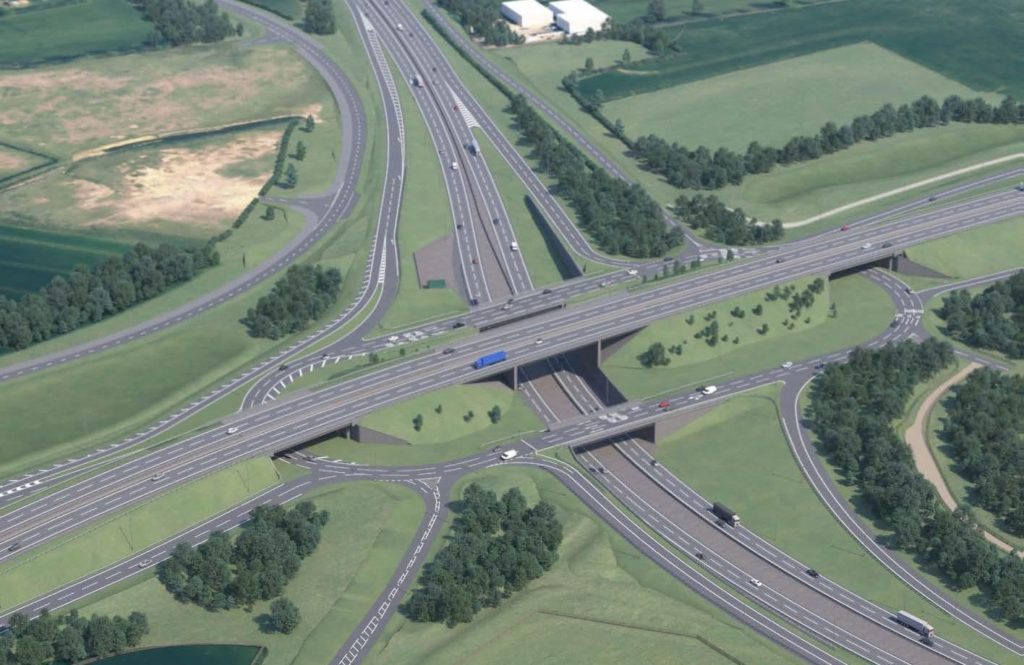Sector - Transport & Infrastructure
New and Updated Plans for A428

New and improved routes for walkers and cyclists, along with better local road access and plans for a more sustainable project, are among changes in the design of one of the UK’s biggest road projects.
Highways England is asking people who live, work and travel in and around Cambridgeshire and Bedfordshire to have the say on their latest designs for the multimillion-pound A426 Black Cat to Caxton Gibbet improvement works, as part of the latest consultation.
The design refinements have been made after detailed analysis of the 925 responses received during last summer’s consultation, as well as new technical information and engagement with the local community and organisations.
The suggested upgrade would see a new 10-mile dual carriageway built which would link the A1 Black Cat roundabout in Bedfordshire with the A428 Caxton Gibbet roundabout in Cambridgeshire. Both the existing roundabouts would also get an upgrade which would turn them into modern, free-flowing junctions, and a new junction would be added at Cambridge Road, near St Neots.
The project would also replace the only remaining section of single carriageway road between Milton Keynes and Cambridge. By doing this, it would help with one of the UK’s most congested hotspots.
The consultation opened on Wednesday 24 June at 00:01am, and will run for five weeks until 23:59pm on Tuesday 28 July 2020. People can respond to the consultation by visiting Highways England’s virtual consultation room, where they can also hear about the changes from Highways England’s technical team, and explore maps and more details about the proposals. Alternatively forms via Freepost are available, or by sending an email.
Lee Galloway, Highways England A428 Programme Lead, said: “The A428 Black Cat to Caxton Gibbet improvements will transform one of the busiest road links in the East of England, helping to save drivers who live, work and travel in and around Bedfordshire and Cambridge an hour-and-a-half on their journeys every week.
“Getting the views of drivers, the local community and businesses is crucial to designing a project that will offer the best value, maximise the benefits for all, while reducing the impact on the local communities and the environment.”
Key changes include:
- The creation of four “borrow pits”, close to where Highways England is building the embankments at Roxton Road, Black Cat junction and Caxton Gibbet junction. This will considerably reduce the need to transport construction materials and will also reduce construction traffic on public roads, while also making the project more sustainable by using earth and spoil from local sources.
- Improving safety for walkers, cyclists and horse riders by upgrading crossings and creating more convenient off-road routes.
- Reducing the visual impact of the scheme by improved landscaping and planting locally sourced trees and shrubs.
- Minimising the disruption to existing businesses and reducing the impact on agricultural land, reducing the impact on farmers by using less land where possible.
- Changes to local access roads to help improve driver access.
Roads Minister Baroness Vere said: “Our roads play a critical role in keeping Britain moving and this project will help to change people’s everyday journeys across the East of England, improving vital links and helping to reduce congestion.
“We encourage everyone to have their say during this consultation and be part of the change as we continue to invest and level up across the country.”
Highways England will be taking an innovative new approach to the consultation, designed to let people find out about the plans and put their questions to the project team, while respecting the current COVID-19 guidelines. These will include:
- A virtual consultation room where people can log on from home via laptop or mobile device to hear about the changes from Highways England’s technical team and explore maps and more details about the proposals.
- Live webchats with the Highways England technical team who can answer any questions that people have about the scheme. (Thursday 2 July 2020 10:00 to 14:00, Thursday 16 July 2020 15:00 to 19:00)
- Telephone information events where people can dial in to hear more details about the consultation. To join dial 0800 640 4956 (Monday 29 June 2020 15:00 to 19:00, Monday 13 July 2020 10:00 to 14:00)
If you would like to read more like this, then please click here
Related Articles
More Transport & Infrastructure News
- Belfast Harbour Secured as £100 Million Hub for Major Offshore Wind Projects
10 Dec 25
Belfast Harbour is set to become the primary assembly and construction hub for two of
- Government Earmarks Rail-Adjacent Land for Accelerated Housing Development
9 Dec 25
The UK government has announced a significant package of planning reforms designed to accelerate the
- Jacobs to deliver advisory services to public sector clients through 2027
3 Dec 25
Jacobs has been named as a supplier on the Crown Commercial Service’s (CCS) Management Consultancy






